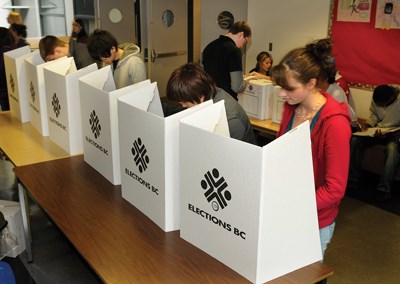Editor:
The referendum on proportional representation (PR) that we are now voting on is all about better representation and about power. PR will give about 90 per cent of the voters an MLA who shares their values, a great improvement on 50 per cent with our present system. PR also gives more power to the voters and less power to the corporations and their political friends in the legislature.
This is the key to understanding the letter by Val Litwin, CEO of the BC Chamber of Commerce, on Proportional Representation (Burnaby NOW online, Oct. 22), which uses specious arguments to try to get people to vote against it. The letter also contained a serious error.
In 2004, one man and one woman from each electoral district were selected by a random process to form the BC Citizens’ Assembly on Electoral Reform. No politicians were allowed. These ordinary citizens spent most of the year becoming experts on electoral systems, asking their citizens what they wanted a new electoral system to accomplish, debated the issues, and designed systems that could best achieve what was wanted. Their considerations resulted in the design of two proportional systems, mixed member proportional (MMP) and single transferable vote (STV). The final votes of the assembly members were:
- 123 to 31 for STV over MMP
- 142 to 11 against retaining the present First-Past-the-Post
- 146 to 7 for recommending STV to British Columbians.
In the subsequent referendum in 2005, B.C. voters voted 58 per cent in favour of STV (not ~61-per-cent against it as originally stated by Litwin). The BC Liberals in power at the time refused to institute STV, though it clearly should have because the process used to arrive at this conclusion is the most legitimate known.
The first question on the mail-in ballot is whether or not you want to change to proportional representation; the answer to this is clearly yes because the Citizens’ Assembly recommended it and because Arend Lijphart, in a study of many countries for many years, found proportional systems are associated with a wide range of good things such as less inequality, less inflation, more satisfaction with government, and kinder gentler societies.
The second question on the ballot asks you to rank three proportional systems, dual member (DMP), mixed member (MMP) and rural urban (RUPR). Any of these will be a significant improvement on the present system, giving voters better representation and more voting power. Of these, RUPR gives the most power to voters as it is STV in the urban regions and MMP in the rural regions of BC. Thus two of the three systems have the legitimacy of the BC Citizens’ Assembly and Litwin’s concerns are invalid.
David Huntley, Burnaby



